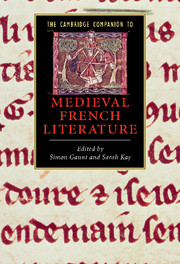Book contents
- Frontmatter
- Introduction
- Part I What is a Medieval French Text?
- Part II What is a Medieval French Author?
- 5 Chrétien de Troyes
- 6 The Châtelain de Couci
- 7 Guillaume de Machaut
- 8 Christine de Pizan
- Part III What is the Value of Genre for Medieval French Literature?
- Part IV How can we read Medieval French Literature Historically?
- Appendix: Reference works for Old and Middle French
- Bibliography of medieval French texts
- Suggested Further Reading
- Index
- Series List
8 - Christine de Pizan
from Part II - What is a Medieval French Author?
Published online by Cambridge University Press: 28 March 2009
- Frontmatter
- Introduction
- Part I What is a Medieval French Text?
- Part II What is a Medieval French Author?
- 5 Chrétien de Troyes
- 6 The Châtelain de Couci
- 7 Guillaume de Machaut
- 8 Christine de Pizan
- Part III What is the Value of Genre for Medieval French Literature?
- Part IV How can we read Medieval French Literature Historically?
- Appendix: Reference works for Old and Middle French
- Bibliography of medieval French texts
- Suggested Further Reading
- Index
- Series List
Summary
The literary corpus of Christine de Pizan (c.1363-c.1431) enacts all aspects of authorship as a performance of gender: not only does Christine self-consciously construct a gendered voice within the rhetorical structures of late medieval literary cultures, but this construct changed and evolved during Christine’s long and prolific career as a writer. Over the course of almost four decades, Christine produced more than twenty texts in verse and prose in a variety of literary genres, including ballade cycles, debate poetry, allegory, epistolary treatises and political tracts, as well as texts such as the Epistre Othea that defy generic classification. Her oeuvre thus demonstrates not only her mastery but also her transformation of literary forms and traditions. In addition, Christine was extensively involved in the production of manuscripts of her texts, even to the extent of supervising the layout and visual programmes (illustration, decoration) of her work. In the course of such intensive textual activity, Christine frequently invokes her personal circumstances in order to situate her literary performances: in autobiographical vignettes and authorial intrusions inserted throughout her work, Christine connects her emergence as a poet in the 1390s to her widowhood. Such comments contextualize her performance as a writer in relation to her experiences as a woman. The Christine corpus is consequently animated by a discourse of life-writing that provides a link between her texts and through which she exposes the gendered structures of literary history. In addition, Christine’s narrators repeatedly refer to the activities of reading and writing that enable as well as authorize literary production. In several of her longer works, as we shall see, she emphasizes the rhetorical foundations of authorship in order to claim for herself, a late medieval woman, the identity of author.
- Type
- Chapter
- Information
- The Cambridge Companion to Medieval French Literature , pp. 123 - 136Publisher: Cambridge University PressPrint publication year: 2008
- 1
- Cited by

